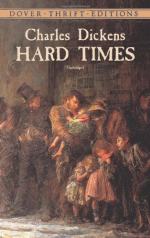|
This section contains 328 words (approx. 2 pages at 300 words per page) |

|
SOURCE: A letter to Charles Eliot Norton on June 19, 1870, in Letters of John Ruskin to Charles Eliot Norton, Vol. II, Houghton, Mifflin and Company, 1904, pp. 4-6.
Ruskin was an English critic, essayist, historian, poet, novella writer, autobiographer, and diarist. Endowed with a passion for reforming what he considered his "blind and wandering fellow-men" and convinced that he had "perfect judgment" in aesthetic matters, he was the author of over forty books and several hundred essays and lectures that expounded his theories of aesthetics, morality, history, economics, and social reform. In the following excerpt from a letter written shortly after Dickens's death, he summarizes the achievement of Dickens, citing Hard Times as the single exception to his depicting the Dickensian hero as an "iron-master. "
My dearest Charles,—I knew you would deeply feel the death of Dickens. It is very frightful to me—among the blows struck by the...
|
This section contains 328 words (approx. 2 pages at 300 words per page) |

|


